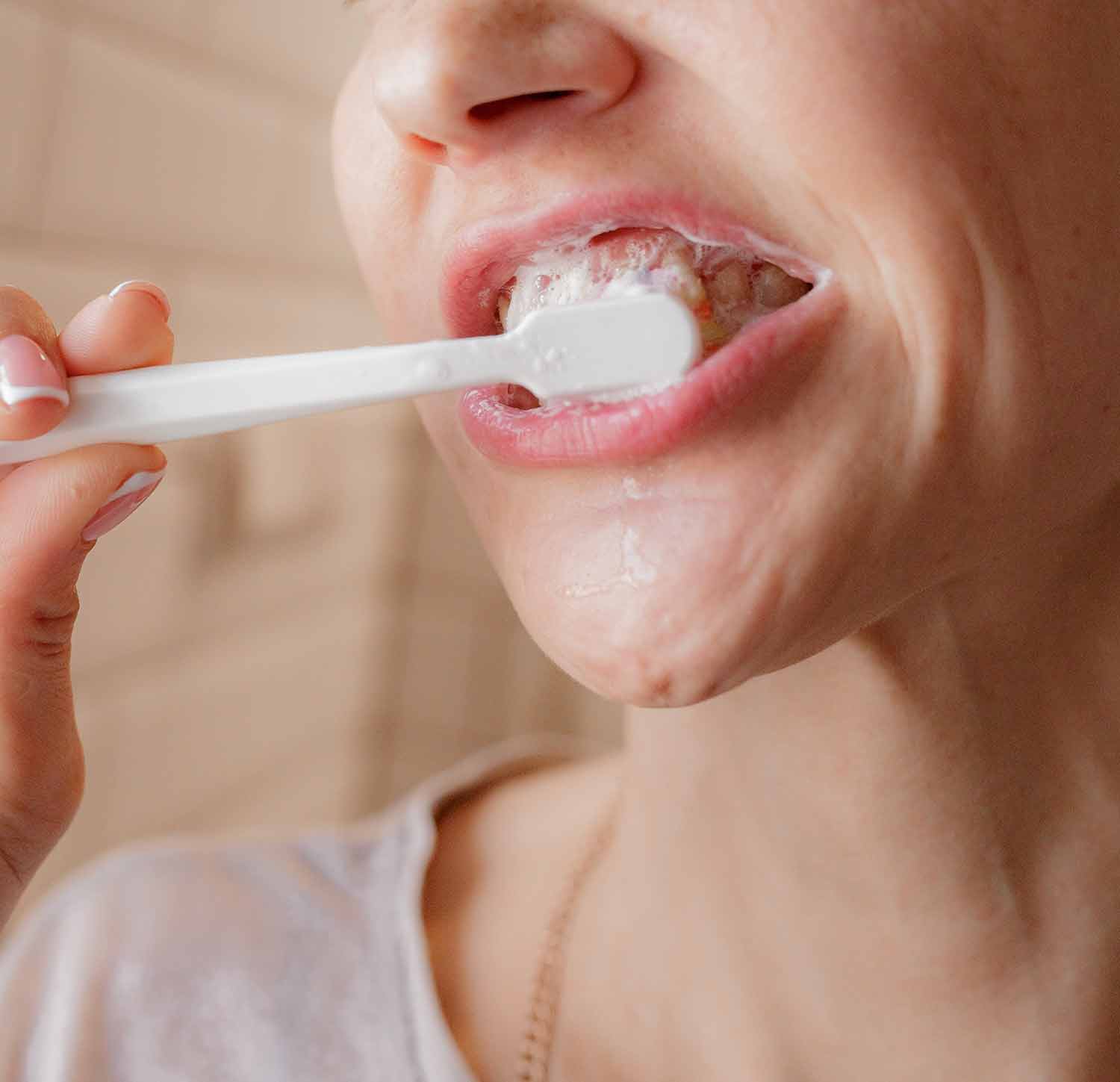Pre & Post Operative Considerations
Pre-Operative Dental Implant Considerations
Dental implant treatment requires surgery and as such, candidates for this treatment must be prepared before undergoing treatment. Implant surgeons provide thorough pre-op dental implant instructions.
Getting dental implants is a process that takes several procedures done over several months. Some of the visits are for oral surgery, so you will have to prepare yourself. Small preparation steps will help to get your body ready for the procedures.
In the meantime, here are some general pre-operative dental implant considerations for your review:

Stop Tobacco and Alcohol Use
Both smoking and alcohol use can inhibit the healing process and increase the risk of complications after surgery. Patients should refrain from drinking alcohol during the week of surgery and during the initial recovery. Alcohol’s effect on the blood can cause bleeding complications, which is why it’s important to cease alcohol consumption before and after surgery.
Smoking and chewing tobacco are more of a concern because they significantly increase the risk of implant failure. Smoking and chewing tobacco increase the risk of gum infections, which can, in turn, infect the dental implant site, causing failure. Smoking also decreases oxygen levels in the blood, making it more difficult for the cells to heal themselves, thereby prolonging the time needed to recover.
Quitting smoking as far ahead of surgery as possible is preferable but should be stopped no later than two weeks prior to surgery and should not continue until a full recovery is made, which can take three or more months.
Disclose Medications to Your Surgeon
Before surgery, it is important to disclose medications, including supplements, you are taking to your surgeon. While some supplements, such as BONE-TITE™ may be helpful before and after surgery, taking certain medications or vitamins during recovery from surgery can lead to complications. Aspirin, vitamin E, Coumadin, and Warfarin can all cause bleeding issues and osteoporosis treatments such as bisphosphonates can be a concern. By discussing your current medications with your oral surgeon, the necessary precautions can be taken to reduce the risk of complications.

Practice Proper Oral Hygiene
Practicing proper oral hygiene, brushing at least twice a day, and flossing at least once a day, is always essential to good oral health but it’s particularly important to keep the mouth clean prior to dental implant surgery. Dental implant surgery requires a small incision to be made within the gums to place the implant within the jaw. In order to prevent the incision from becoming infected, it’s helpful to practice good oral hygiene habits well before surgery to reduce the amount of bacteria within the mouth and to prevent gum disease. Before surgery, patients will be given instructions on how to brush and floss after surgery to protect the newly placed dental implant. Patients are also instructed to start a regimen of BONE-TITE tablets in order to help strengthen soft tissues and support bone health in preparation for the implant procedure.
Arrange for Transportation to and from Surgery
Before undergoing dental implant surgery, patients should arrange for someone to take them home on the day of their surgery. This is because the effects of sedatives and anesthesia can last for a few hours after surgery, making it unsafe to drive yourself home after treatment.

Preparation Affects Outcome
Patients should also take some time to prepare for recovery prior to undergoing dental implant surgery. Some things to gather before surgery to help with recovery include soft foods, ice packs, and a soft-bristled toothbrush to avoid irritating the incision site when brushing. Patients should also have a comfortable spot set up to relax immediately after surgery.
How you take care of yourself before each procedure will affect how fast and how well you heal. The preparation may sound like a good deal of work, but do not worry, the dentist will guide you every step of the way.
Post-Operative Dental Implant Considerations
Dental implant treatment requires surgery and as such, candidates for this treatment must be prepared before undergoing treatment. Implant surgeons provide thorough pre-op dental implant instructions.
Getting dental implants is a process that takes several procedures done over several months. Some of the visits are for oral surgery, so you will have to prepare yourself. Small preparation steps will help to get your body ready for the procedures.
In the meantime, here are some general pre-operative dental implant considerations for your review:

For the Remainder of the Day Following Surgery
- Do not spit. Use a tissue to wipe your mouth as needed or swallow your saliva.
- Do not use a drinking straw. Drink straight from the cup.
- Do not smoke.
- Keep fingers and tongue away from the surgical area.
Spitting, the use of a straw, smoking, and poking the surgical area can dislodge the blood clot that is forming and will cause bleeding from the area. Also, smoking can increase the chances of an infection.
Bleeding & Swelling
Some minor bleeding is expected after dental implant surgery. It will usually subside quickly and stop within an hour or two after surgery. A little oozing is normal and may persist for several hours.
- Keep gauze on the surgical area with some biting pressure for 30–45 minutes.
- If all else fails, call the office.
Most patients will experience some swelling after surgery in the mouth. It may be mild or severe and is different for every patient. The swelling may increase for the first 24–48 hours before it starts to go away. It may last for several days. Some bruising may also develop on the face.

Diet
Drink plenty of fluids. Avoid hot liquids or food. It is sometimes advisable to confine the first day’s intake to liquids or pureed foods (soups, puddings, yogurt, milk shakes, etc.). Do not use a straw for the first few days after surgery. You may resume a regular diet as soon as you feel up to it; however, please try not to chew directly on the implant sites.
A specific healthy diet regimen (Mediterranean Diet) and key micronutrients, such as those contained in BONE-TITE™, might play a key role in the different phases of dental implant osseointegration, the direct structural and functional connection between living bone and the surface of an artificial implant. Recent evidence demonstrated diet can affect healing, influencing both the morphology and the quality of alveolar bone. Bone tissue repair mechanisms and bone metabolism are strongly influenced by nutritional aspects and are crucial to obtaining proper bone restoration optimizing osseointegration processes.
What to Expect
You may start rinsing tomorrow, very gently, with some warm salt water (1 tsp of salt in 8 ounces of warm water). You may brush your teeth per usual, though be very careful near the surgical sites.
Ask your doctor if you need to be scheduled to come back for suture removal.
Unless told otherwise, the sutures used during your procedure are dissolvable and will fall out on their own. This generally occurs in the first week after surgery, but timing varies from 4–10 days.
If your surgeon placed bone graft material at the time the dental implant was placed, you might notice some gritty material in your mouth. This is nothing to worry about and should subside within a day or two.

Will I be able to see the Implant?
Generally, you will not see the implant, especially if a temporary crown or set of teeth are connected to the implants at the time of implant surgery.
Depending on the location and stability of the implant being placed, your surgeon may opt to bury the implant under the gum tissue. In time, you will return and have the implant uncovered so the implant can be restored.
If stability is optimal, the second stage procedure can be bypassed, and an attachment is placed that protrudes through the gum tissue, which will be visible. Once the bone has healed, the restoring dentist will be able to access the implant without the need for further surgery.
When will the Crown be Placed?
A dental crown can be attached to a dental implant once the implant has fused to the bone. Again, this is a process called osseointegration.
The length of time the bone must heal varies from case to case and will be discussed with your surgeon. The length of time needed for osseointegration is a function of the bone quality, quantity, and implant stability at the time of placement.
With good primary stability at the time of implant placement surgery, a temporary crown or bridge may be secured.
If primary stability is weak, then temporary may be avoided and postponed for 12 weeks or more while osseointegration takes place.

Medications
You may be given one or more prescriptions for medications.
- Antibiotics: Continue until the bottle is empty. Do not quit halfway.
- Pain Medicine: It may be necessary to take narcotic pain medication regimen (every 4–6 hours) for the first 24 hours and as needed thereafter. Remember that narcotics can make you drowsy, so no driving, swimming, operating machinery, or drinking alcoholic beverages while you are taking them.
- You may wean yourself off the narcotic medication and substitute 500 mg of acetaminophen (Tylenol®). If directed to do so, you may use ibuprofen, 600 mg, every 6 hours while awake, for the first 4 or 5 days.
- Rinsing: Your doctor may prescribe a special mouth wash, such as Peridex.
- Supplement: If recommended, you should take BONE-TITE, supplement for implant patients, as directed, to help with healing and support osseointegration.
Once you are no longer taking narcotic pain medication, you may resume your normal activities as you feel up to it.
Note: All information on this website is intended for your general knowledge only and is not a substitute for medical advice or treatment for a specific medical condition. Please consult your physician if you have questions or concerns regarding your health.
* These statements have not been evaluated by the Food and Drug administration. This product is not intended to diagnose, treat, cure or prevent any disease.
Pre & Post Operative Considerations
Pre-Operative Dental Implant Considerations
Dental implant treatment requires surgery and as such, candidates for this treatment must be prepared before undergoing treatment. Implant surgeons provide thorough pre-op dental implant instructions.
Getting dental implants is a process that takes several procedures done over several months. Some of the visits are for oral surgery, so you will have to prepare yourself. Small preparation steps will help to get your body ready for the procedures.
In the meantime, here are some general pre-operative dental implant considerations for your review:

Stop Tobacco and Alcohol Use
Both smoking and alcohol use can inhibit the healing process and increase the risk of complications after surgery. Patients should refrain from drinking alcohol during the week of surgery and during the initial recovery. Alcohol’s effect on the blood can cause bleeding complications, which is why it’s important to cease alcohol consumption before and after surgery.
Smoking and chewing tobacco are more of a concern because they significantly increase the risk of implant failure. Smoking and chewing tobacco increase the risk of gum infections, which can, in turn, infect the dental implant site, causing failure. Smoking also decreases oxygen levels in the blood, making it more difficult for the cells to heal themselves, thereby prolonging the time needed to recover.
Quitting smoking as far ahead of surgery as possible is preferable but should be stopped no later than two weeks prior to surgery and should not continue until a full recovery is made, which can take three or more months.
Disclose Medications to Your Surgeon
Before surgery, it is important to disclose medications, including supplements, you are taking to your surgeon. While some supplements, such as BONE-TITE™ may be helpful before and after surgery, taking certain medications or vitamins during recovery from surgery can lead to complications. Aspirin, vitamin E, Coumadin, and Warfarin can all cause bleeding issues and osteoporosis treatments such as bisphosphonates can be a concern. By discussing your current medications with your oral surgeon, the necessary precautions can be taken to reduce the risk of complications.

Practice Proper Oral Hygiene
Practicing proper oral hygiene, brushing at least twice a day, and flossing at least once a day, is always essential to good oral health but it’s particularly important to keep the mouth clean prior to dental implant surgery. Dental implant surgery requires a small incision to be made within the gums to place the implant within the jaw. In order to prevent the incision from becoming infected, it’s helpful to practice good oral hygiene habits well before surgery to reduce the amount of bacteria within the mouth and to prevent gum disease. Before surgery, patients will be given instructions on how to brush and floss after surgery to protect the newly placed dental implant. Patients are also instructed to start a regimen of BONE-TITE tablets in order to help strengthen soft tissues and support bone health in preparation for the implant procedure.
Arrange for Transportation
Before undergoing dental implant surgery, patients should arrange for someone to take them home on the day of their surgery. This is because the effects of sedatives and anesthesia can last for a few hours after surgery, making it unsafe to drive yourself home after treatment.

Preparation Affects Outcome
Patients should also take some time to prepare for recovery prior to undergoing dental implant surgery. Some things to gather before surgery to help with recovery include soft foods, ice packs, and a soft-bristled toothbrush to avoid irritating the incision site when brushing. Patients should also have a comfortable spot set up to relax immediately after surgery.
How you take care of yourself before each procedure will affect how fast and how well you heal. The preparation may sound like a good deal of work, but do not worry, the dentist will guide you every step of the way.
Post-Operative Dental Implant Considerations
Dental implant treatment requires surgery and as such, candidates for this treatment must be prepared before undergoing treatment. Implant surgeons provide thorough pre-op dental implant instructions.
Getting dental implants is a process that takes several procedures done over several months. Some of the visits are for oral surgery, so you will have to prepare yourself. Small preparation steps will help to get your body ready for the procedures.
In the meantime, here are some general pre-operative dental implant considerations for your review:

For the Remainder of the Day Following Surgery
- Do not spit. Use a tissue to wipe your mouth as needed or swallow your saliva.
- Do not use a drinking straw. Drink straight from the cup.
- Do not smoke.
- Keep fingers and tongue away from the surgical area.
Spitting, the use of a straw, smoking, and poking the surgical area can dislodge the blood clot that is forming and will cause bleeding from the area. Also, smoking can increase the chances of an infection.
Bleeding & Swelling
Some minor bleeding is expected after dental implant surgery. It will usually subside quickly and stop within an hour or two after surgery. A little oozing is normal and may persist for several hours.
- Keep gauze on the surgical area with some biting pressure for 30–45 minutes.
- If all else fails, call the office.
Most patients will experience some swelling after surgery in the mouth. It may be mild or severe and is different for every patient. The swelling may increase for the first 24–48 hours before it starts to go away. It may last for several days. Some bruising may also develop on the face.
Diet
Drink plenty of fluids. Avoid hot liquids or food. It is sometimes advisable to confine the first day’s intake to liquids or pureed foods (soups, puddings, yogurt, milk shakes, etc.). Do not use a straw for the first few days after surgery. You may resume a regular diet as soon as you feel up to it; however, please try not to chew directly on the implant sites.
A specific healthy diet regimen (Mediterranean Diet) and key micronutrients, such as those contained in BONE-TITE™, might play a key role in the different phases of dental implant osseointegration, the direct structural and functional connection between living bone and the surface of an artificial implant. Recent evidence demonstrated diet can affect healing, influencing both the morphology and the quality of alveolar bone. Bone tissue repair mechanisms and bone metabolism are strongly influenced by nutritional aspects and are crucial to obtaining proper bone restoration optimizing osseointegration processes.
What to Expect
You may start rinsing tomorrow, very gently, with some warm salt water (1 tsp of salt in 8 ounces of warm water). You may brush your teeth per usual, though be very careful near the surgical sites.
Ask your doctor if you need to be scheduled to come back for suture removal.
Unless told otherwise, the sutures used during your procedure are dissolvable and will fall out on their own. This generally occurs in the first week after surgery, but timing varies from 4–10 days.
If your surgeon placed bone graft material at the time the dental implant was placed, you might notice some gritty material in your mouth. This is nothing to worry about and should subside within a day or two.

Will I be able to see the Implant?
Generally, you will not see the implant, especially if a temporary crown or set of teeth are connected to the implants at the time of implant surgery.
Depending on the location and stability of the implant being placed, your surgeon may opt to bury the implant under the gum tissue. In time, you will return and have the implant uncovered so the implant can be restored.
If stability is optimal, the second stage procedure can be bypassed, and an attachment is placed that protrudes through the gum tissue, which will be visible. Once the bone has healed, the restoring dentist will be able to access the implant without the need for further surgery.
When will the Crown be Placed?
A dental crown can be attached to a dental implant once the implant has fused to the bone. Again, this is a process called osseointegration.
The length of time the bone must heal varies from case to case and will be discussed with your surgeon. The length of time needed for osseointegration is a function of the bone quality, quantity, and implant stability at the time of placement.
With good primary stability at the time of implant placement surgery, a temporary crown or bridge may be secured.
If primary stability is weak, then temporary may be avoided and postponed for 12 weeks or more while osseointegration takes place.

Medications
You may be given one or more prescriptions for medications.
- Antibiotics: Continue until the bottle is empty. Do not quit halfway.
- Pain Medicine: It may be necessary to take narcotic pain medication regimen (every 4–6 hours) for the first 24 hours and as needed thereafter. Remember that narcotics can make you drowsy, so no driving, swimming, operating machinery, or drinking alcoholic beverages while you are taking them.
- You may wean yourself off the narcotic medication and substitute 500 mg of acetaminophen (Tylenol®). If directed to do so, you may use ibuprofen, 600 mg, every 6 hours while awake, for the first 4 or 5 days.
- Rinsing: Your doctor may prescribe a special mouth wash, such as Peridex.
- Supplement: If recommended, you should take BONE-TITE, supplement for implant patients, as directed, to help with healing and support osseointegration.
Once you are no longer taking narcotic pain medication, you may resume your normal activities as you feel up to it.
Note: All information on this website is intended for your general knowledge only and is not a substitute for medical advice or treatment for a specific medical condition. Please consult your physician if you have questions or concerns regarding your health.
* These statements have not been evaluated by the Food and Drug administration. This product is not intended to diagnose, treat, cure or prevent any disease.
